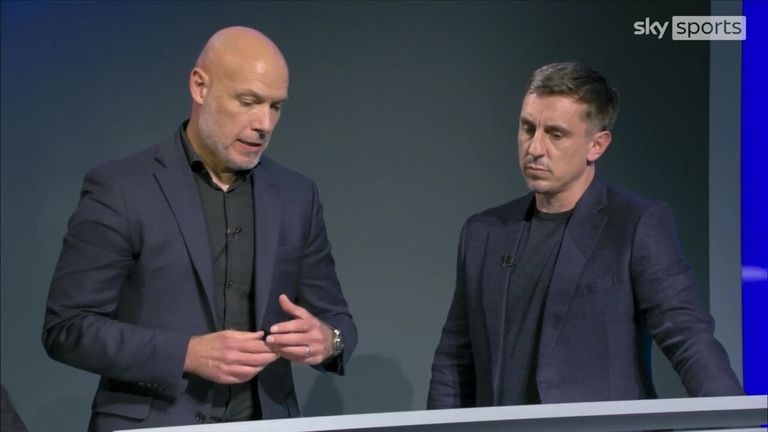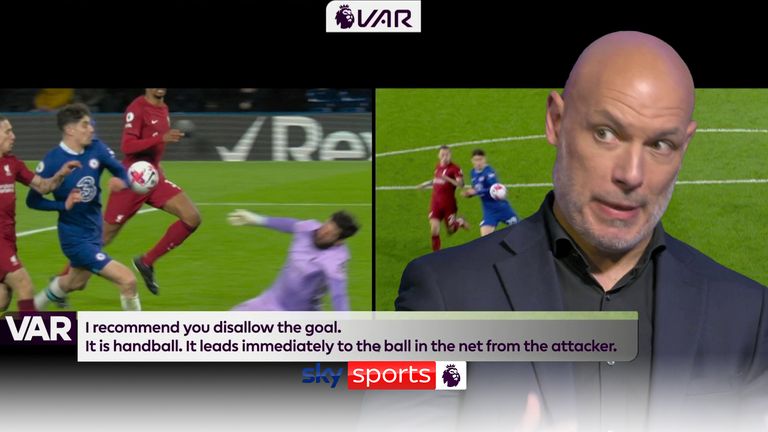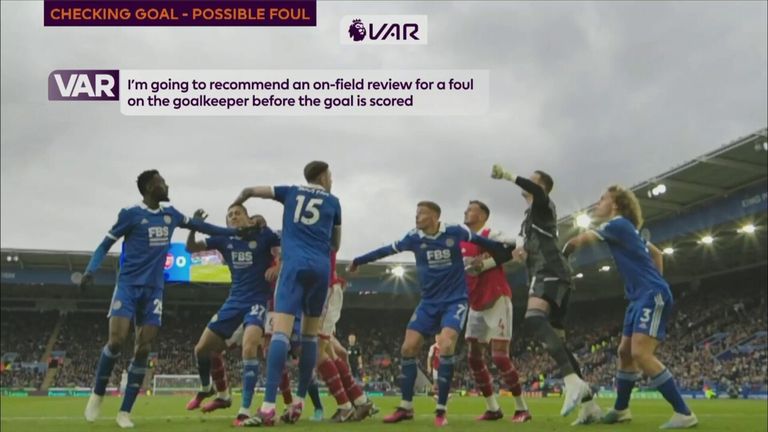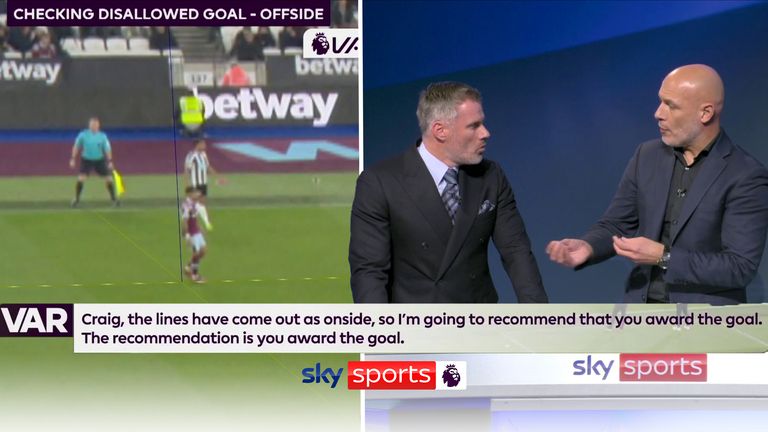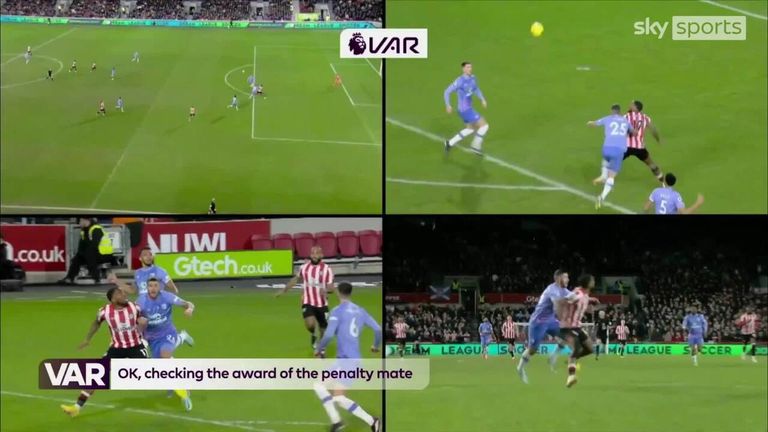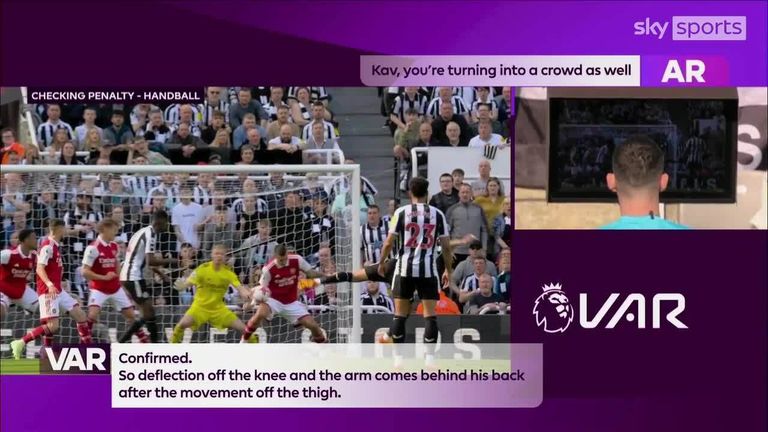What did we learn about VAR from PGMOL chief Howard Webb on Monday Night Football?
PGMOL chief refereeing officer Howard Webb was a special guest on Monday Night Football to explain several VAR calls throughout the 2022/23 season; Webb analysed never-before-seen footage of in-game audio from key decisions and wants to reveal more in the future to increase transparency
Tuesday 16 May 2023 16:24, UK
PGMOL chief refereeing officer Howard Webb wants to reveal further in-game audio from key decisions and is aiming to make VAR more consistent.
In a ground-breaking edition of Monday Night Football, Webb joined Jamie Carragher and Gary Neville to talk through unheard audio between mic'd-up referees, their assistants and the VAR officials during decisions made this season.
Sky Sports went behind the curtain with Webb to explain the VAR process using both correct and incorrect calls in a bid to increase transparency around one of the most contentious aspects of the game.
- WATCH: Howard Webb explains VAR decisions with in-game audio
- Get Sky Sports | Download the Sky Sports App
- How to watch free Premier League highlights
- Stream the biggest moments on NOW
"We made a commitment to be more transparent," said Webb on Monday Night Football. "We know and recognise that people want more information about refereeing processes, particularly with the advent of VAR.
"We want to show spectators what goes into making the decisions on the field and then how the VAR works as well. We've got a professional group of officials working hard to have a positive impact on the game."
'We are making a small step forward'
Webb analysed five clips explaining "factual" and "clear and obvious" decisions, "cross-hairs" to draw offside lines and "APP" (Attacking Phase of Play) - the phase of play from the start of an attack that leads to the incident that's reviewable - to dissect the VAR decision process.
Real-time audio was heard from the on-field officials, the referee, the assistant referees and the fourth official, who make the on-field judgement. The VAR and the assistant VAR were also heard as they checked the decision.
They are also assisted by a replay operator, who gives the officials the angles they need to see before making those important calls as to whether or not they intervene.
While the never-before-seen footage cannot change an outcome after the event, Webb hopes it can go some way to making clubs and supporters more understanding of how officials reach their decisions.
"We'll be looking to do this as much as we possibly can," he said. "Obviously, this is something new. We are making a small step forward and going into next season we'll be looking to do more of the same.
"We can't play it live in-game; that is not allowed within the laws of the game. FIFA don't allow it to be played out during the game. Who knows where that might go in the future? But there is nothing stopping us from doing what we are doing tonight and showing that information later.
"We made a commitment at the start of this that we'd have a lot of dialogue with clubs. I've been into most of the Premier League clubs and had really good conversations, played audio to them and acknowledge numerous situations to them - some privately and occasionally publicly when something is quite obvious. We had a couple of situations early in the season where the process of VAR wasn't followed quite correctly.
"We want people to understand how good our officials are, to understand the rationale. People might not always agree with the outcome but when they can hear the rationale and see the process, they're much more prepared to accept the final decision in those circumstances. We've been doing that all the way through."
Clear and obvious vs factual decisions
One of the major talking points around the introduction of VAR has been the definition of "clear and obvious" decisions compared with "factual" ones.
Webb highlighted how Kai Havertz's goal for Chelsea against Liverpool was judged as a factual decision whereby the referee wasn't instructed to the pitchside monitor by the VAR.
"Clear and obvious in itself is a judgement," said Webb. "We've got clearly correct decisions at one end of the scale and clearly wrong ones at the other, and then there is a whole swathe of subjective ones in the middle.
"I am really keen to make our use of VAR consistent. The VARs at Stockley Park each weekend are recognising the incidents that are clear situations and the ones to get involved in, not the ones that could be or might not be decisions because they may have different views on what might be, but they will all recognise consistently when a decision is clearly wrong."
'We don't want to re-referee games'
Part of the balancing act is not to have the VAR "re-refereeing" matches. Ben White's foul on Leicester's Danny Ward came from the contact being sustained and impacting the goalkeeper's influence on the ball which the referee hadn't seen in a crowded penalty area.
"From the very start of this project around the world, I was involved in the implementation in the US, the phrase, 'maximum benefit, minimum interference' was coined and it still applies," said Webb.
"We want this tool not to re-referee the game but to be there to identify those clear situations that are unjust, that need an intervention. It's a great tool in situations like this [with White and Ward] where officials can't see something but the camera does show it. There's a lot of subjectivity in the game and situations that would split opinions on first view. They can also split officials' opinions on first view. The skill of the VAR is to recognise when it's not a situation like that.
"If we move the scale further towards a clear and obvious threshold then we can gain more consistency and you can all get behind what VAR is there to do, not re-referee the game but capture those really big clear situations that are wrong."
Why are offside decisions sometimes delayed?
One clip heard how after Joelinton had been flagged offside after scoring for Newcastle before the tight decision was overturned by the VAR.
The assistant referee, who made the on-field decision, immediately apologised to his team of officials for being wrong.
"They will be disappointed they get it wrong on the field. They are judged by the decisions they make on the field. Of course, we have VAR as a safety net, but the officials want to get the decision right on the field in real-time," said Webb.
He also explained why the assistant referees occasionally delay their offside decisions and then still raise their flag even though the VAR would check the incident.
"Without VAR, they raise it straightaway. We don't always know for certain that the camera will reveal the answer perfectly. Sometimes it can be in a position on the field where it's more difficult to judge therefore he has to show his hand and make a decision," said Webb.
"If he didn't raise the flag and we couldn't check it for whatever reason through VAR then that judgement, which is offside in his mind, would never come to the final decision and a goal would be allowed to stand wrongly. It's a good process, it's tried and tested.
"We do say to the guys, don't delay unnecessarily. If you know it's clearly offside or there's no attacking opportunity. We know it causes frustration when the flag is delayed in certain circumstances."
Accuracy over speed
Webb analysed one incident where Brentford's opener in their 2-0 home win over Bournemouth came after Ivan Toney was brought down inside the box by Marcos Senesi with VAR not overturning the decision. Toney had initially fouled Senesi but the VAR didn't check the entire incident.
The decision was made quickly although ultimately it was the wrong outcome.
"We're asking the VARs to be efficient as they can be," said Webb. "We know long checks can cause some frustration but we're hoping by playing these audios out, you can see there's a process we have to go through with diligence to make sure we're not missing certain things.
"We can't sacrifice accuracy for speed."
Are referees being influenced by the VAR when they go to the monitor?
The audio revealed how the VAR explains their reasoning to the referee for instructing them to the pitchside monitor as they watch the incident, but is it swaying the outcome?
"We want the referee to make the final decision at the screen. They're provided with the video evidence the VAR has looked at and formed the opinion that something is clearly wrong," said Webb. "The final call is the referee's, apart from the situations that are factual.
"The VAR will say: 'This is why I'm sending you, have a look at this aspect, you make the final call'."
